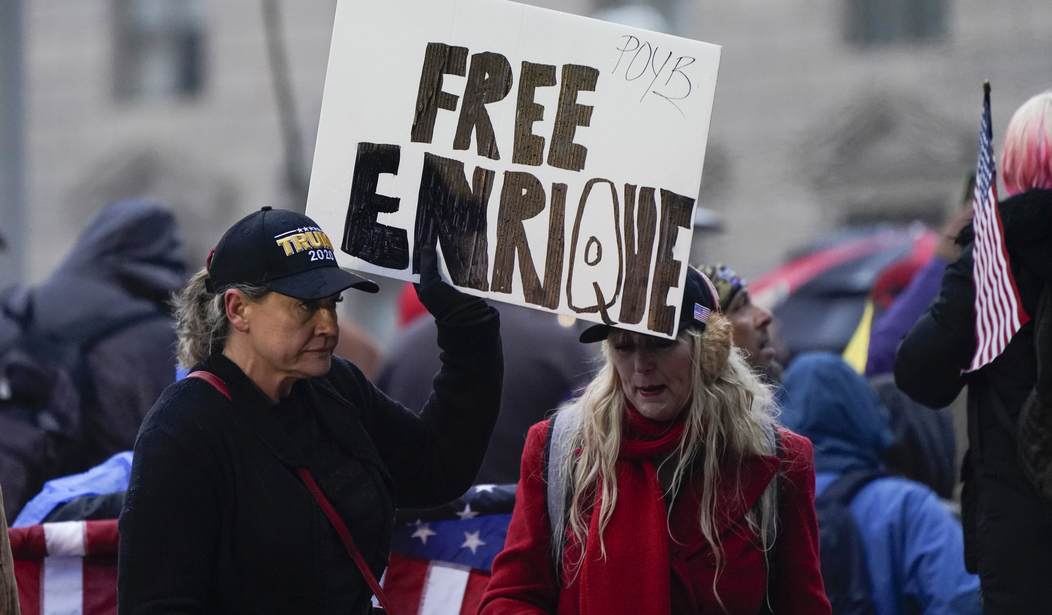When President Trump made a pledge to pardon January 6 prisoners, with the exception of those convicted of acts of violence, and commute the sentences of that latter category, that seemed like an elegant way to resolve a delicate problem of justice and fairness.
Releasing non-violent J6 prisoners was a campaign pledge. There is no doubt that they were targeted in a way no other act of protest has ever been. The judges were hostile to the defendants, and the jury pool was impossibly prejudiced. The dicier area came with January 6 prisoners who had tussled with police and inflicted property damage. Their sentences were frequently well in excess of similar crimes, indeed draconian. Splitting the prisoners into two groups and releasing them both, but not making the releases equal, made a lot of sense. Everyone would be out of jail, but the "worst" offenders would not be pardoned.
Vice President JD Vance articulated that policy in his appearance on "Fox News Sunday" on January 12.
So how did that play out?
When the list of those with commuted sentences was released, I did some exploring to see what came up. In cases of multiple charges, I chose the most serious one, of course; YMMV.
Stewart Rhodes — seditious conspiracy
Kelly Meggs — seditious conspiracy
Kenneth Harrelson — tampering with documents
Thomas Caldwell — tampering with documents
Jessica Watkins — interfering with a law enforcement officer
Roberto Minuta — seditious conspiracy
Edward Vallejo — seditious conspiracy
David Moerschel — seditious conspiracy
Joseph Hackett — seditious conspiracy
Ethan Nordean — seditious conspiracy
Joseph Biggs — seditious conspiracy
Zachary Rehl — seditious conspiracy, pepper sprayed police
Dominic Pezzola — broke a window, fought with police
Jeremy Bertino — seditious conspiracy
(Amuse yourself with this search tool: Search the Index | Insurrection Index).
According to the index, at least 50 of the January 6 prisoners were convicted of violence against persons or property damage. Virtually none of them had sentences merely commuted.
The bottom line is that there are only two men on the list, Dominic Pezzola and Zachary Rehl, who could plausibly be characterized as someone who engaged in anything violent. The real bright line was having an affiliation with Proud Boys, Oath Keepers, or 3-Percenters. Everyone on the list except Pezzola has one of those affiliations and was tried for seditious conspiracy. Harrelson (4 years), Caldwell (time served), and Watkins (8 years, 6 months) were charged with seditious conspiracy but acquitted, though two of them still managed to draw multiple years in prison.
What happened? Because whatever happened did not involve parsing out guys who fought with the police from everyone else.
According to Axios, the story is pretty simple.
Between the lines: Early in the internal discussions, Vance actually had advocated for a blanket pardon. But the Yale-trained lawyer figured Trump wouldn't want to take the hit for releasing notorious convicts.
- The case-by-case review was onerous. Trump staffers wondered whom to pardon and who might slip through the cracks.
- Time was running out heading into Inauguration Day. Trump wanted to pardon as many people as possible and get it over with, so he landed on clemency for everyone.
In my view, whatever the process, the correct result was reached. Too much fine-tuning between cases would inevitably result in disparities and hard feelings with Trump's base. The political downside, according to The Daily Beast in an article that repeats the totally debunked claim that a Capitol Police officer died in the demonstration, was marginal. "As far as they’re concerned, the issue was already litigated in November, when voters proved they didn’t actually care enough to abandon Trump over the matter." A further calculation probably was that if no one cared in 2024, they won't care in 2026 or 2028.
The only troubling part of the affair is that, given the high profile of that particular campaign promise, no one ever got around to reviewing the cases and making a pardon list until the week before the inauguration. The other troubling part is that the most unjust sentences, those of the Proud Boys, Oath Keepers, and 3-Percenters for "seditious conspiracy," were allowed to stand while John Brennan, James Comey, and Adam Schiff are allowed to walk around free.














Join the conversation as a VIP Member